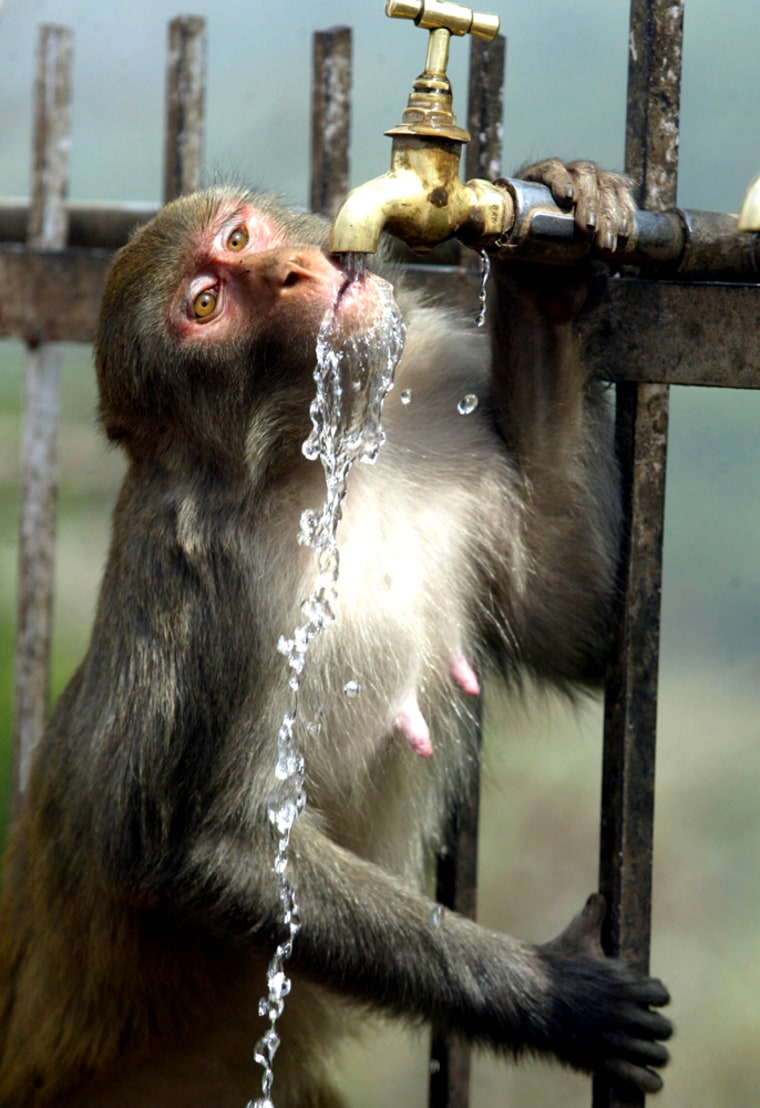A north Indian state unveiled plans Thursday to train unemployed youths to sterilize thousands of wild monkeys with lasers in a bid to combat the aggressive primates who have been attacking people and raiding farms.
The proposal, which drew immediate condemnation from environmentalists, has underscored the desperation of Indian authorities trying to modernize the country amid an economic boom, while contending with the thousands of wild monkeys, stray dogs, sacred cows and assorted wildlife that roam the streets of India.
Monkeys have proved to be particularly problematic.
Tens of thousands of them live in and around Indian cities, many encouraged to frequent public places like temples and office buildings by devout Hindus who feed them, believing them to be manifestations of the god Hanuman.
In recent months, the deputy mayor of New Delhi was killed when he fell from his balcony during an attack by wild monkeys, while 25 others were wounded when a monkey went on a rampage in the city.
The mountainous state of Himachal Pradesh has a particularly bad problem, infested with rhesus macaque monkeys, who prefer the easy life of taking food from humans or raiding farms than foraging for food in forests — many of which have been cut down.
Tackling two problems at once
The state's newly elected chief minister, Prem Kumar Dhumal, who took office earlier this week, sought Thursday to tackle two of state's most pressing problems at the same time — marauding monkeys and unemployment.
Dhumal said that Himachal Pradesh would go on a "war footing" to fight the thousands of monkeys who have been turning farms into wastelands and attacking people, according to a statement from his office.
"Affected districts would be identified and local youth involved in the process, who would be provided training in capturing and sterilization by the experts," the statement quoted Dhumal as saying, adding that they would use "laser sterilization."
Participants in the program would be paid, Dhumal said.
The capacity of zoos in the area would be expanded to accommodate captured monkeys, and camps may be set up for them to protect farmland and crops, the statement said.
Dhumal was speaking after a high-level state meeting on the subject.
Conservations say plan is ‘totally insane’
Conservationists condemned the proposal to let untrained youths sterilize monkeys, saying it was cruel and would not solve the problem.
Sujoy Chaudhuri, an ecologist who co-authored a report by prominent primatologists and conservationists that was submitted recently to the federal and state governments, said inexperienced youths would not be able to sterilize the monkeys properly.
"This is totally insane, it requires a huge amount of expertise to wield those machines," he said.
"It is a ridiculous idea and what is worse, it will do nothing to contain the problem and probably make it worse," said Chaudhuri. "Can you imagine what having badly sterilized monkeys running around will do to the levels of aggression?" he said.
Chaudhuri said sterilization was also not an effective way to contain the monkey population or stop them raiding crops, as it took eight-to-ten years to have an effect.
Only an effective, scientific and humane culling program, or confining the monkeys to reserves they could not escape, while providing them food would work, he said.
Other conservationists criticized the government for ignoring scientific proposals and adopting populist policies that provided very few real solutions.
"So much work and thought and expertise has been put into the subject, you feel foolish," said Belinda Wright, the director of the Wildlife Protection Society of India.
"The government chooses not to act on recommendations from experts and instead comes out with these absurd proposals," she said.
